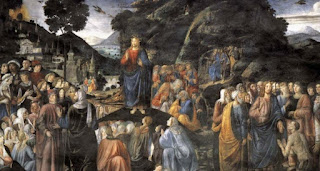Second Sunday of Lent: Cycle C - March 13, 2022
Readings: Genesis 15:5–12, 17–18; Psalm 27:1, 7–9, 13–14; Philippians 3:17–4:1; Luke 9:28–36
 |
| (Transfiguration of Jesus by Peter Paul Rubens) To listen to my audio-video reflections on YouTube, please click on this link |
On 12th of March 2022, the Society of Jesus (Jesuits) worldwide celebrates the 400th anniversary (1622) of the canonization of its founding Fathers, St Ignatius of Loyola and St Francis Xavier. For us, Jesuits it's a time for renewal and to recommit ourselves to embrace the grace of holiness. Ultimately our only desire is to see God and to know God, even as He knows us. The life of these two men is nothing but a long story of conversion which led them to canonization, the honour of the altar. Their dreams of youth were replaced by an extraordinary experience of the encounter of God which brought them to the people of unknown geographies. Coming from noble and wealthy families, both Ignatius and Xavier would begin to work under the Banner of the Cross, embracing Christ the poor and humble. They would set out to enkindle the fire of love from Rome to India to Japan and finally to China. The Mount Tabor experience of the disciples of Jesus, Peter, James and John would set them in another direction where they would immerse themselves in the beauty of transfiguration and be transformed by it completely.
1. God is a tremendous and fascinating mystery to be experienced
Our life pushes through from one experience to another, from one event to another. Each experience is meaningful and gives a certain direction, which might not be completely visible and actual at the moment of its happening. The transfiguration experience that Jesus goes through on that mountain with his three close disciples, Peter, James and John not only clarifies the mission of Jesus clearly, but it also strengthens the faith and confidence of disciples in the person of Jesus. The gospel reading of today which is read during every Lenten season gives a call to each one of us his followers to experience the transfiguration experience of Jesus in some part of our life. To be an authentic follower of Jesus, we too must have that experience of our Master. Just like those disciples who went through this deep and unexplainable experience, we too are invited to immerse ourselves into this experience of the Lord.








